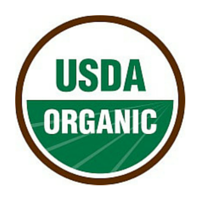If you are a food manufacturer serving the natural food industry and you’re not already doing organics, you’ve probably wondered the following:
What would it take for us to get organic certified? And would it really be worth it?
I recently sat down with our Quality Control Manager and our Warehouse Manager to ask just these questions. I wanted to find out, exactly what it takes to get USDA Organic Certified. I asked questions like:
- What is the process to become organic certified?
- How challenging is it?
- What can the warehouse expect?
- What can purchasing expect?
- How long is it going to take us?
These answers, along with an analysis of your target market, will help you answer the big question: is it worth it for your business?
Let’s dig in.
What Is The Process To Become Organic Certified?
 To become organic certified, there are a number of pre-emptive, big picture steps your business is going to have to take. First off, you’re going to need to source organically certified ingredients. Your supply chain is going to need to be set up to document this fact, including both by collecting paperwork and tracing lot codes for each ingredient.
To become organic certified, there are a number of pre-emptive, big picture steps your business is going to have to take. First off, you’re going to need to source organically certified ingredients. Your supply chain is going to need to be set up to document this fact, including both by collecting paperwork and tracing lot codes for each ingredient.
You’re also going to need to produce your products in an organic certified food production plant — either your own or a co-packers. If it is your own, you will need to go through all of the steps to get your facility organic compliant. The primary concern here is to mitigate any risk for cross contamination with non-organic products. Therefore, if your plant processes only organic products, you might have a slightly easier time than if you have both conventional and organic product lines. If you are working with a co-packer, it’s a bit simpler: you’ll just need to choose a co-packer who is already organic certified.
Then you’ll need to go through the process of getting organic certified. You can expect a paperwork and process review on both the purchasing side and the production side, as well as a facility audit. On the purchasing side of things, you will need to provide your suppliers’ documentation, show your traceability process, prove that this is being upheld on every lot being tracked, etc. On the production side, you will need to document each of your production and quality processes to show that you are upholding practices that will avoid cross-contamination and that you are using all organic compliant materials, packaging, soaps, etc.
At the very end, you will also have a facility audit to display that your purchasing and production processes are firmly in place, and allow them to review any other details that relate to your ingredients or your facility.
Of course, for all of this you will have to pay for this certification. The total price depends on how complex your process is, and will also vary greatly by state.
The Steps Of The USDA Organic Certification Process
If you want to find out more details about exactly what this process looks like, this is how the USDA describes the three key phases of certification:
Desk Audit
The initial accreditation processes is a documentation adequacy review (a.k.a. desk audit) to evaluate the compliance of the applicant’s quality manual with NOP regulatory parameters. This process begins once a completed application is received by NOP and an auditor is assigned. This process may take up to three months.
Pre-Decisional Assessment
Once NOP has determined that the desk audit is satisfactory, NOP staff conducts a pre-decisional on-site assessment to review your organization’s key activities, conduct witness inspections, interview staff and contractors and possibly review certification files. Upon a successful assessment, the NOP Accreditation Committee makes a recommendation to the AMS Administrator to approve accreditation. As noted above, NOP 2000 provides detailed information about the complete accreditation process, including on-site assessments and continued accreditation. This process may take up to six months.
Post-Accreditation Requirements
Once approved, your organization will be accredited for five years. To ensure compliance, an additional on-site assessment is conducted around the two and half year mark. Renewing ACAs will have on-site assessments prior to renewal around the five year mark. These assessments are performed by the NOP and are subject to the costs described above.
How Challenging Is It To Get Organic Certified?
This is a subjective answer, and usually depends on if your facility is already only organic and if you’ve already sourced all of your organic ingredients.
In relation to other certifications, to keep it in perspective, it is equal in rigor to a 3rd party audit.
The good news is that if you are getting Non-GMO Project Verified, this process is much easier if you have an organic certification already in place — this is because you’ve already developed your traceability and cross-contamination avoidance processes, so you’re a step ahead of the game.
What Can My Warehouse Expect?

Your warehouse can expect that the USDA will do a detailed review of all of their processes. Anything that would be documented in a 3rd party audit in terms of health and safety will be reviewed. Even if you know your processes and have them set up in your warehouse, they do need to be written to be valid.
They will also want to see how you are tracking your packaging and ingredient lots, and how you are avoiding cross contamination. So expect first to write a lot, and do this long before the certifiers arrive.
Your warehouse can also expect an in-person facility audit. A USDA NOP staff member is assigned for a site inspection, and checks all of the health practices, purchasing and traceability systems, etc.
Everything that you use in your facility has to be approved for use in an organic certified facility. Therefore, if you decide that you want to buy a specific soap for your wash station in your production area, it has to be approved by the USDA organic certifying agency. They thoroughly review each facility including production lines, manufacturing inputs, packaging, hygiene and safety, etc.
Expect that this audit will take 1 day, if not more. Centra Foods site inspection was 5-7 hours; however, due to our business model, we have a reasonably simple process — manufacturers who produce a product with many different inputs may have a more in-depth audit that would take much longer.
What Can Purchasing Expect?

Your purchasing department can expect a full and detailed inspection of paperwork. Your organic certifier will be checking if you are documenting your suppliers up-to-date and valid organic certifications.
They also review all of your paperwork on your ingredient inputs, packaging inputs, and traceability of all of your production and outgoing products.
They will also want to audit your purchasing system, to make sure that you have a buying process set up that is traceable, measured and consistent.
How Long Will It Take To Get Our Organic Certification?
This process is less about the time it takes to get the actual certification in hand (or even the time it takes to do the audit) and more about the time that it takes to set up and confirm all of those big-picture processes and policies, as well as secure a strong and dependable organic ingredient supply chain.
Of course, once you set these processes up, you’ll then need to request the certification and pay your dues. After that, you’ll have to wait until an auditor is able to visit you. And then the final time for them to process your paperwork and release your statement. So plan to give yourself some time to complete this certification!
On average, this process can take from 1 month to 1 year, depending on how much of the back end process you need to set up and perfect first.
Is Getting Organic Certified Worth It?
This is a question that you will need to answer for your company. If you are a new company serving the natural and organic market and/or trying to sell into Whole Foods or Costco, usually the answer is yes.
Being organic differentiates your product and typically gives you more demand from these larger businesses. Costco won’t openly admit it, but we have heard from a number of vendors that they are leaning towards any products that are organic over just conventional or even non-gmo verified.
The trade off is this: getting organic certified is going to cost more, but in the end, your prices will also be higher to make up for that cost and you will make the same as you would if it was a conventional product.
To make the final call, you’ll need to do a full business review to determine if this is right for your product category and target market.
Topics: Organic, Quality Control












